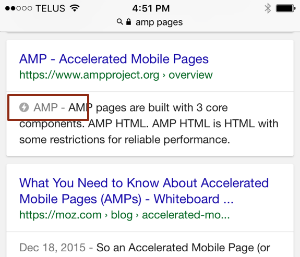Stop Living in the Present
Mobilegedon never amounted to much. It was a catchy headline, there was loads of hype, and people did push the panic button, but that’s about it. I met Rand Fishkin at the BCAMA 2015 Vision Conference in Vancouver, BC. Rand Fishkin is Founder and former CEO of Moz, author, visionary, and one of the world’s top ranked SEO experts. He was the keynote speaker and we talked while he was waiting to be introduced. He wasn’t interested in giving much time to the topic of Mobilegedon and his presentation really had nothing to with it. The presentation was awesome and packed with practical and fundamental strategies for SEO, but he didn’t talk about Mobilegedon. Flash forward a couple of years and this doesn’t mean that you can delay your mobile initiatives in the least. Mobile Internet usage has overtaken desktop usage, and Google is clearly, and almost single-handedly, creating a mobile-first future.
96% of mobile search market belongs to Google.
95.85% to be precise according to NetMarketShare. Google all but consumes the competition in the mobile & tablet search market. In likewise fashion Google commands desktop search as well, where they control 80.52% of the search market.
Google is clearly steering the direction of search toward a mobile-first world.
For over a year (or longer) Google has been a vocal statesman of the Internet. Their privacy policy makes the bold proclamation "We help make the Internet safe for everyone". Most everyone knows that Google is much more than a search engine. They’re involved with the advancement of machine learning, AI, driverless cars and quantum computing. When it comes to ‘Google the search engine’ though, it's always been an 'us vs. them' situation for site owners, webmasters, SEOs and marketers. Google has always been vague, almost cryptic in its announcements about what they’re doing with search. On Nov. 4, 2016 Google posted a simple, but very clear message about their agenda for pivoting to a mobile-first index saying, "we’ve begun experiments to make our index mobile-first.” In the same post they go on to say, "...our algorithms will eventually primarily use the mobile version of a site’s content to rank pages from that site." The message is clear and nothing. The course is set, and nothing will likely change.
Google is dedicated to shifting the Internet paradigm from desktop to mobile.
Straightforward statements like “we’ve begun experiments to make our index mobile-first” are clear messages. When you line their statements up with other signals coming from Google, the message is crystal clear. So What Else is Google Doing? The technologies and companies that Google is investing in and acquiring are clear indicators they are moving ahead with shaping a mobile-first world. For example, Google appears to be seriously devoted to investigating entity, predictive and personalized search. Their effort is logical considering the steady increase of mobile search and the use of home assistants. The same goes for Google’s exploration of voice search, something that is almost exclusive to the mobile device experience at this time. By default Google is already using machine and deep learning in every facet of Google Search. Even updates to the search algorithms seem to be focused on moving the mobile-first vision forward. The extension of Google Hummingbird is a way to gradually learn about how users phrase conversational queries. Hard work is being done to understand natural language and the meaning of implicit and compound facets of conversation - even metaphors. But wait... There's More  There’s the rise of AMPs (Accelerated Mobile Pages) which Google has pioneered. It’s hard to find out if Google uses AMP as a weighted ranking factor, but they are favoring sites that have switched over to AMPs, giving them visibility in a carousel and a small lightning bolt icon indicating their AMP status. As a rule, most typical business websites a large percentage of their traffic is coming from organic search. Developments with mobile search should be high on everyone’s radar. If you don't have a mobile site, or the mobile site you have uses a different version of content than the desktop, you need to seriously consider making your website responsive sooner than later. Is There Any Good News Chicken Little? The sky isn’t falling! Google has made their intentions clear, and some of their business activities align perfectly with their move to a mobile-first index. Let’s literally take a page for the cautionary tale, and follow the lead of Chicken Little and his friends. Instead of panic, take a thoughtful, planned approach to your mobile strategy. Plan for the future, plan according to how your target audiences are using search, and keep an eye on the direction Google is moving with this mobile-first index initiative.
There’s the rise of AMPs (Accelerated Mobile Pages) which Google has pioneered. It’s hard to find out if Google uses AMP as a weighted ranking factor, but they are favoring sites that have switched over to AMPs, giving them visibility in a carousel and a small lightning bolt icon indicating their AMP status. As a rule, most typical business websites a large percentage of their traffic is coming from organic search. Developments with mobile search should be high on everyone’s radar. If you don't have a mobile site, or the mobile site you have uses a different version of content than the desktop, you need to seriously consider making your website responsive sooner than later. Is There Any Good News Chicken Little? The sky isn’t falling! Google has made their intentions clear, and some of their business activities align perfectly with their move to a mobile-first index. Let’s literally take a page for the cautionary tale, and follow the lead of Chicken Little and his friends. Instead of panic, take a thoughtful, planned approach to your mobile strategy. Plan for the future, plan according to how your target audiences are using search, and keep an eye on the direction Google is moving with this mobile-first index initiative.
So how do you live in the present, but plan for the future?
The Most Valuable Step Ensure your website works properly on all devices, and no, a ‘m-dot version’, or a content-paired-down responsive version will not do. Those approaches acted as bridges only. Responsive Web Design (RWD) is the standard now. Make sure that no matter how your website is viewed the content is the same on all devices. The Next Step People are doing different things on their different devices (the average person owns 3.6 Internet connected devices). The context of how people search is going to influence what they are trying to accomplish. Your next step is to conduct user research and find out what those differences are, because with RWD you can deliver variations of your pages based on the device. This could mean that you re-order content on a mobile device compared to a desktop. It’s the same content, just presented differently to optimize the user experience to the context. What Else Can be Done? You need to start rethinking keywords research. You can’t just pick a relevant keyword based on potential search volumes, or competition. On October 26, 2015 Google confirmed the use of RankBrain. RankBrain is an artificial intelligence (AI) program used to help Google process search queries. Written language has been embedded into its vast amount of computations so that it can understand what people are looking for when they ask, or type in a query. The selections of keywords of the future are going to much more structured around natural language in action. Here’s a great article from a leading SEO authority about how to approach keyword research for a mobile-first world.
The Fundamentals Matter
Most people I’ve talked to about what is important for SEO will mention, keywords, backlinks, social media, quality vs quantity, on-page SEO and on and on. All valid. Let’s take a step back and look at this at a higher level because it provides a different perspective.
Agism is Search If there was a guiding principle for SEO it should be trust. Google cares about how old your site is. Not the date it was registered, but how long your website’s content has been in their index. Typically websites that are newcomer to Google will have a much more difficult time ranking than a site that has been in Google’s indexed for ages. Authority Google wants to see a link profile coming from high quality content from across the interwebs. This means quality links. Google cares about the authority of the sites, and the quality of the content on those site. Make sure your links are coming from a diverse range of websites. They shouldn’t be coming from the same source. Link building is ongoing so never rest when it comes to this tactic. The Foundation Your underlying content is extremely important so don’t cut corners. The quality of the content you publish is directly linked to Google's relevancy algorithms. Content not only has to be lengthy, but even more so, it has to be well-written, keyword centric and highly engaging. Two things happen when you are producing quality content. People engage with it, and that makes Google happy. Other websites are more likely to want to share and link to your content, and this makes Google happy.
Wrapping Up Google is going to make their index of website mobile-first. You can bank on it. People are going to use search (mosty on Google) to find stuff. You can bank on this too. Make sure they find you.




